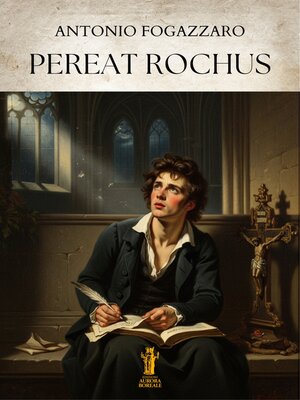
Sign up to save your library
With an OverDrive account, you can save your favorite libraries for at-a-glance information about availability. Find out more about OverDrive accounts.
Find this title in Libby, the library reading app by OverDrive.



Search for a digital library with this title
Title found at these libraries:
| Library Name | Distance |
|---|---|
| Loading... |
Antonio Fogazzaro (1842-1911), a writer, poet, and essayist, was a major figure in Italian literature and culture. He was a multiple nominee for the Nobel Prize in Literature and a key interpreter of Modernism and an Italian approach to Romanticism. Although he was always a Catholic, his works often addressed controversial themes such as reincarnation and the destiny of souls, and he remained open to modern scientific theories.
One of Antonio Fogazzaro's less-known but most interesting works, the short novel Pereat Rochus, which many sources consider the author's favorite work, was first published, in installments, in the Corriere di Roma in January 1886, two years later in the magazine Nuova Antologia, and then included the following year in the collection Fedele ed altri racconti.
The protagonist is a young poet named Andrea, who finds himself in an abbey. Here he meets the old abbot, Don Rocco, and other characters. The story focuses on Andrea's internal conflicts, as he feels divided between art, religion, and earthly feelings. The title, which in Latin means "may Rocco perish", refers to a jocular phrase pronounced by one of the characters, but it can also be interpreted as a wish to overcome material obstacles and temptations to elevate oneself spiritually.
The novel reflects themes dear to Fogazzaro, such as the conflict between faith and science, the search for a balance between spirit and matter, and the spiritual crisis of modern man. The style is characterized by elegant prose and an in-depth psychological analysis of the characters.
One of Antonio Fogazzaro's less-known but most interesting works, the short novel Pereat Rochus, which many sources consider the author's favorite work, was first published, in installments, in the Corriere di Roma in January 1886, two years later in the magazine Nuova Antologia, and then included the following year in the collection Fedele ed altri racconti.
The protagonist is a young poet named Andrea, who finds himself in an abbey. Here he meets the old abbot, Don Rocco, and other characters. The story focuses on Andrea's internal conflicts, as he feels divided between art, religion, and earthly feelings. The title, which in Latin means "may Rocco perish", refers to a jocular phrase pronounced by one of the characters, but it can also be interpreted as a wish to overcome material obstacles and temptations to elevate oneself spiritually.
The novel reflects themes dear to Fogazzaro, such as the conflict between faith and science, the search for a balance between spirit and matter, and the spiritual crisis of modern man. The style is characterized by elegant prose and an in-depth psychological analysis of the characters.







